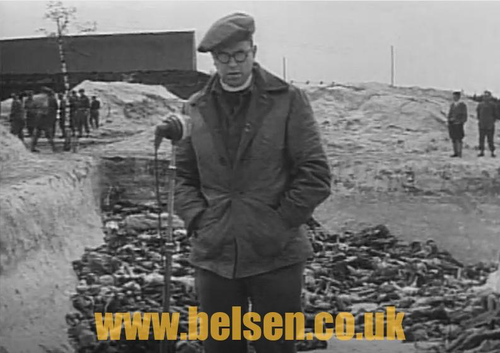‘This camp has dealt in one commodity… death"
Ewan Lawry considers the WW2 service of The Reverend T J Stretch and the liberation of Bergen-Belsen concentration camp
Thomas James Stretch was born in Goodwick, Pembrokeshire, on 17 January 1915, before studying at St David’s College, Lampeter and, in 1938, becoming curate at Holy Trinity Church, Aberystwyth. Ordained shortly before war broke out in 1939, his ministry at Holy Trinity continued until April 1943 when, having enlisted as an army chaplain, he departed with a private communion set presented to him by grateful parishioners. A few days after the D-Day landings, Stretch embarked for France with the British Second Army, which then battled through the Low Countries and into Germany. Weeks after crossing the Rhine in early April 1945, German army representatives offered to surrender Bergen-Belsen concentration camp, where a typhus epidemic had broken out.

As chaplain to 10 Garrison Detachment (Military Government), Stretch was therefore amongst the first to enter the camp, finding almost 60,000 inmates, most sick and starving, and 13,000 unburied bodies. Amidst the horror, Stretch and the chaplains were tasked with performing mass burials and attempting to comfort the survivors. With the unfortunate distinction of being one of the first to see firsthand the crimes that had been perpetrated in the name of racial purity, Stretch was filmed in front of an open mass grave. “Never in my life have I seen such damnable ghastliness”, he said.
That morning they had buried 5,000 bodies, the pit he stood in front of contained 5,000 more. He also wrote a report for the Church Times contrasting the “really beautiful” scenery surrounding Belsen, with its “undulating hills and vast pine forests”, and “the hideous doings… hidden behind them”.
Ensuring that readers were under no illusions about the nature of the camps, he went into graphic detail about the conditions, describing how inmates drank ditchwater, slaughtered and devoured a raw pig, and then died because their stomachs could not manage even a little food. He was disgusted at the way that the German guards “treated the internees as beasts” and “gloated over the suffering”, regretting that so many were identifiable only by the numbers tattooed on their arms (for which the corresponding records had been destroyed). The only comfort he found was in seeing the inmates begin to get “a little of their self-respect back”.
After the war, Stretch returned to parish ministry, serving across Lancashire before his death in October 1973. He concluded his Church Times article poignantly: “what I have seen, I shall never forget”.